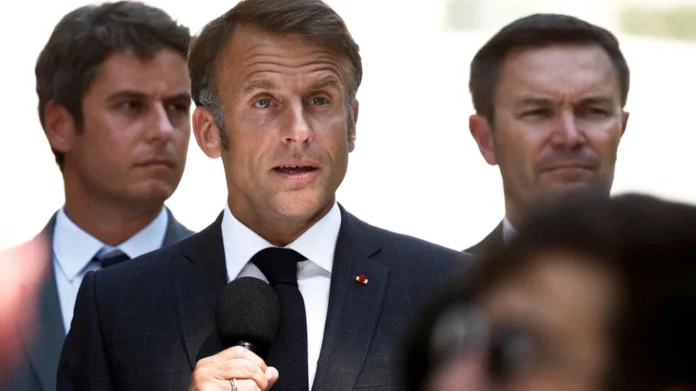
The Paris 2024 Olympics concluded with a spectacular closing ceremony, leaving the world dazzled by the summertime success and a renewed sense of French national pride. However, as the festivities wind down, President Emmanuel Macron is confronted with a political crisis that he had temporarily set aside for the duration of the Games.
With the closing ceremony behind him, Macron must now navigate through impending talks over government jobs and budget cuts, which are expected to ignite voter anger. The temporary reprieve provided by the Olympics is over, and the reality of a hung parliament and political discord looms large.
Christine Frant, 64, expressed the sentiments of many at the Club France fan zone last weekend: “Now we have to wake up from this beautiful dream. Such a shame we’re going to return to our day-to-day routine, with no government, squabbles in parliament, while here it was all about joy, sharing.”
In a bold move, Macron called a snap legislative election just weeks before the Games commenced. The outcome was a hung parliament, complicating the selection of a prime minister who could appease Macron’s centrist camp, a leftist alliance, and the far-right National Rally.
The July 7 election led to days of fruitless political negotiations, prompting Macron to declare a political truce during the Olympics. This gave him until mid-August to appoint a prime minister and allow political parties to negotiate.
The Games began with an ominous start due to mysterious sabotage on railway and telecoms targets, but the event proceeded without further security incidents. Macron made occasional appearances in Paris, including a notable moment when he embraced French judo champion Teddy Riner after his victory.
While the nation followed the exploits of athletes like the Lebrun brothers in ping pong and swimmer Leon Marchand, political maneuvering continued behind the scenes.
Macron now faces the challenge of making a crucial decision, yet he appeared unhurried in an interview with sports daily L’Equipe. He refrained from hinting at his choice for prime minister, instead emphasizing the unity and greatness the French displayed during the Games.
“Often, when you switch the TV on or read a newspaper, there is talk of decline. The French have rediscovered they can do great things together,” Macron said, expressing hope that this newfound goodwill could bridge political divisions.
Despite his optimistic outlook, it remains uncertain whether Macron can leverage the success of the Games for political gain. His chief adversaries, far-right leader Marine Le Pen and leftist Jean-Luc Melenchon, were notably subdued during the event, but their criticism is expected to resurface.
Decision Time Looms
Macron has so far disregarded the candidate proposed by the left-wing New Popular Front, which emerged as the leading force in the elections. Despite efforts to raise her profile, Lucie Castets remains a relatively unknown figure in French politics.
“Who is she?” wondered Zahera Dakkar, 41, after watching the volleyball final at Club France. “I haven’t followed politics for two weeks. The Games were an escape from all that.”
Castets’ chances of securing the prime minister’s office appear slim. Macron believes the National Assembly’s center of gravity lies in the center or center-right. A source close to the president indicated that a prime minister capable of engaging with both the center and the socially-minded right is crucial.
Xavier Bertrand, a former conservative minister under ex-President Jacques Chirac, is seen as a potential candidate. Bertrand has criticized Macron but has worked constructively with his government in his northern region stronghold.
Bernard Cazeneuve, a former prime minister under Socialist President Francois Hollande, is also considered a viable option. Both men’s offices did not respond to requests for comment.
Budget Challenges Ahead
Whoever Macron appoints as prime minister will face the daunting task of securing parliamentary approval for the 2025 budget. France is under pressure from the European Commission and bond markets to reduce its deficit.
“If Macron tries to name a sort of rightist government, he will get no budget,” warned Eric Coquerel, the leftist head of the finance committee in parliament.
Macron’s supporters hope to use the successful collaboration during the Olympics, organized by a centrist president, a Socialist mayor, and a conservative regional leader, as a model for what France can achieve through unity.
However, his rivals are determined to prevent him from claiming any credit. Senator Laure Darcos remarked that they would ensure the president gains no political advantage.
International Standing Bolstered
Despite domestic challenges, the Olympics have enhanced Macron’s international reputation. Michael Payne, a former International Olympic Committee marketing chief, noted that Macron is viewed abroad as “the leader who delivered.” However, Payne also suggested that calling the snap election before the Olympics rather than after may have been a strategic error.
At Club France, where families took selfies with the Olympic torch and bought red mascots, few were willing to discuss politics. “Please, no!” exclaimed Frant, adorned with a French flag.
As the euphoria of the Olympics fades, Macron’s ability to navigate the political minefield ahead will determine whether the unity and pride inspired by the Games can translate into political stability and progress. The world watches as France transitions from the grandeur of the Olympic stage to the intricate dance of its domestic politics.